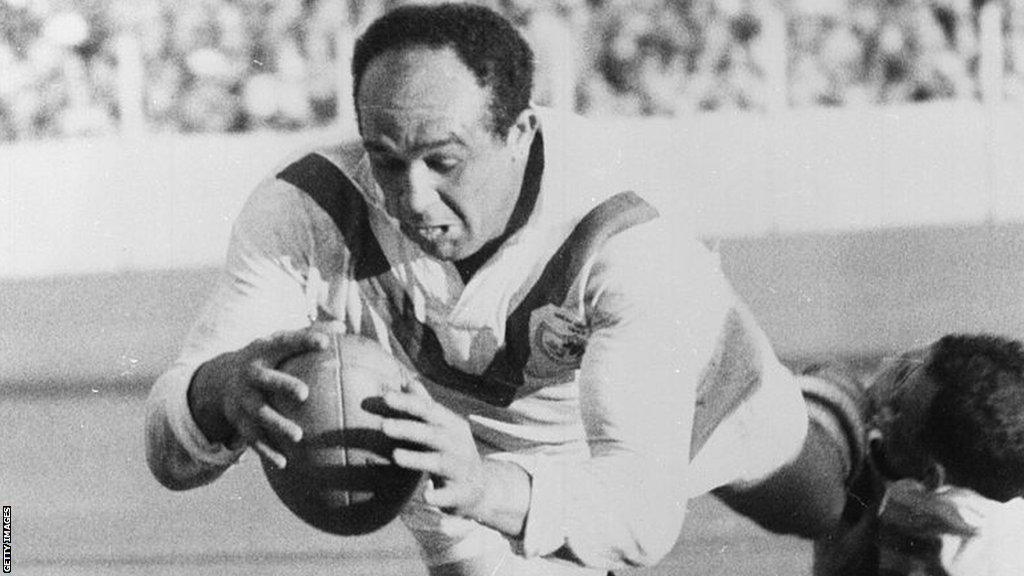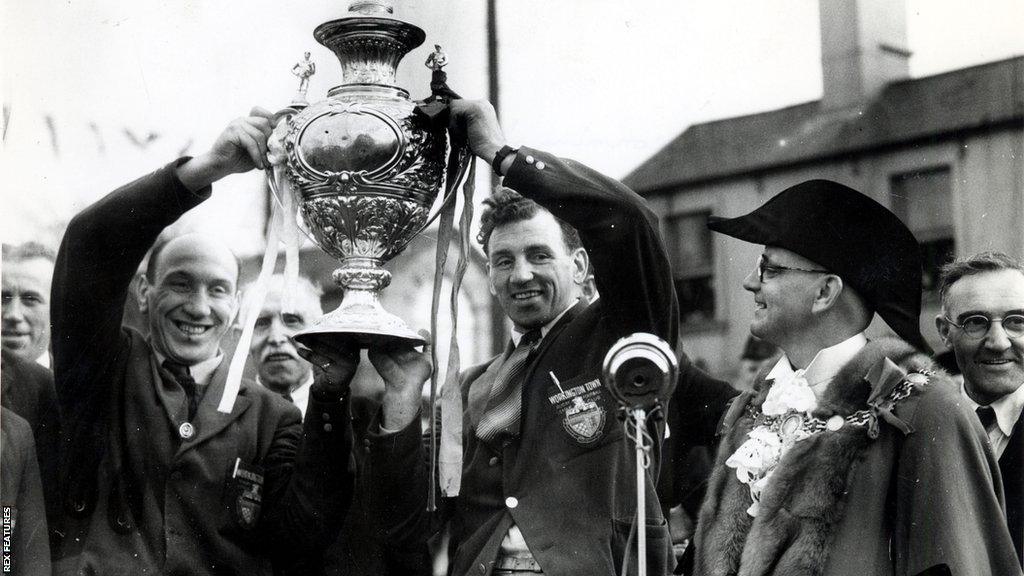Rugby trailblazers Billy Boston, Clive Sullivan and Gus Risman 'finally recognised' in Wales
- Published
Statue of Welsh rugby league legends Billy Boston, Gus Risman and Clive Sullivan unveiled
It has taken more than half a century for Wales to celebrate what the rest of the world recognised a lifetime ago.
Three rugby players of such skill, speed and strength that they have roads, avenues, trophies, balls and grandstands named after them elsewhere.
Yet Billy Boston, Clive Sullivan and Gus Risman have passed unrecognised in their home country - until now.
A statue has been unveiled in Cardiff Bay celebrating three of Welsh rugby's greatest exports and pioneers.
That the inclusion of Boston and Sullivan marks the first statue of non-fictionalised, named black men in Wales hints at the struggles they faced.
It also rights a commonly perceived wrong that this recognition has been too long coming.
Previously there were only four statues to rugby players in Wales: Gareth Edwards (Cardiff), Ken Jones (Blaenavon), Phil Bennett (Felinfoel) and Ray Gravell (Llanelli). Boston now has three dotted around the UK.
Long before Whitchurch High School could boast of alumni including Gareth Bale, Sam Warburton and Geraint Thomas, the South Church Street School in Butetown was churning out sporting greats.
Boston, born to an Irish mother and a father from Sierra Leone, was the latest of a line that included Risman, Colin Dixon, Johnny Freeman and champion boxer Joe Erskine.
He had dreamed of playing for Cardiff, but the club, who had previously ignored so many talented black players from Butetown, were not forthcoming.
So when Wigan laid £3,000 in notes on his mother's kitchen table, the deal was done and 19-year-old Boston burst into tears. At the time, rugby union banished for life anyone paid to play and Boston knew his dream was over.
"Billy says he didn't want to go because he wanted to play for Cardiff and Wales. Cardiff were slow off the mark in those days and didn't have a good record of picking black players and Wales didn't pick one until the 1980s," said another Cardiff-raised rugby league legend, Jim Mills.
"You'd have to say the family made the right decision because he became one of the biggest names in rugby league. And still is.
"He was quick, strong, and scary. When he tackled you, you knew about it. But off the field he was a delight, and still is."
Boston would become one of the the greatest try-scorers in rugby history - union or league - with 571 in 562 matches.

Billy Boston was Great Britain's first black player before going on to make 31 appearances
He was the first black player to tour with Great Britain, won the World Cup in 1954 and entered into several halls of fame as well as having statues in his honour raised in Wigan and at Wembley.
Now 88 and suffering dementia, it was his close friend Mills who read out his words at the latest statue unveiling in the Welsh capital.
"There have been plenty of awards, honours and pats on the back, even statues, but this is one of the highlights of my life," said Boston.
"There are not many left who would have seen me play, but to have this recognition from the people of Cardiff is wonderful.
"Wigan adopted me and the people became like a second family, but with this statue, it looks like after 70 years away that I'm back home to stay now."
Boston was one of three names chosen by a panel of experts and a public vote from 13 players all born in and around the docklands of Cardiff, an area once known as Tiger Bay.

Gus Risman (centre) scored more than 4,000 points between 1929 and 1954
Risman, the son of a Latvian sailor, went to the same school as Boston, is already on the rugby league statue at Wembley and has streets named after him in Salford and Workington.
He played 19 times for Great Britain, toured Australia three times and scored 4,052 points in 873 games.
Sullivan was another trailblazer. He became the first black player to captain any British rugby team and won the World Cup in 1972, external with a sensational 90-metre try against Australia.
The main road into Hull carries his name, the city's two clubs, who he represented, compete for a trophy in his honour while even the balls at the 2021 World Cup were called 'The Sully Ball'.
Yet as his nephew and former Wales striker Nathan Blake said: "His achievements were outrageously good. A true icon in the north of England, but in Wales - the country he loved - few people know his name."
This statue could change that.
GB captain Clive Sullivan scores wonder try in 1972 final
"These three players are legends of the game whose achievements will last for the history of the game," said Rugby Football League (RFL) chairman Simon Johnson.
"We all now the reasons why players like Billy, Clive and Gus weren't able to achieve their dreams in Wales.
"A lot has changed, but I'm proud that they all found such a home in rugby league. Even in the 1950 and 60s, rugby league was diverse and welcoming for players to fulfil their potential."
Times did change and some 30 years later, his son Anthony, switched codes in the opposite direction, from St Helens to Cardiff and played union for Wales.
"There has been more recognition recently for my father's achievements in the game and many of those who played with him have said they were long overdue," said Anthony.
"Players like him and Billy paved the way for people like myself to do what we did. But I think they would both have dearly loved to have had the chance to come back and play for Wales at union.
"Hopefully now this statue can be an inspiration to the community and the young kids in the area of what they can achieve."
Rugby league continues to grow in Wales, now with 3,000 registered players, and while the names on the statue may be unfamiliar to many, their legacy can endure.
"It's been a long time coming in Cardiff," said Mills.
"But when people see these players being honoured, they will be looking at three of the finest Welsh sporting ambassadors and players of all time."